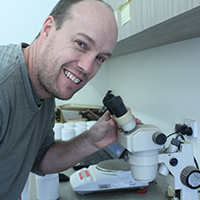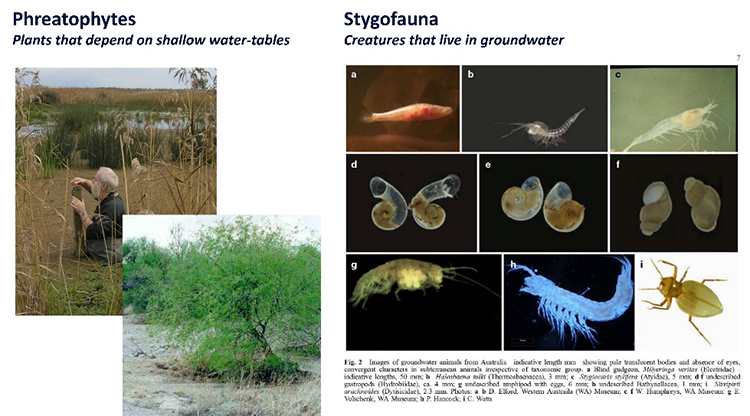
CeRDI Newsletter Autumn 2025
In this issue:
- Message from the Director
- Soil CRC appointment: Dr Nathan Robinson, Program Leader
- Central Highlands drought resilience project
- Why should we care about groundwater?
- Where’s wormy? Research to determine the distribution of Barber’s Pole worm in sheep across Victoria
- Harnessing legacy data for new insights
- Exploring diverse paths to graduate research at CeRDI: Sonia Proctor, PhD candidate
- Early career researcher seed funding: Project outcomes
- Dr Peter Weir, Alumnus
- News snippets
- HDR news
- About CeRDI
- Contact CeRDI
Message from the Director
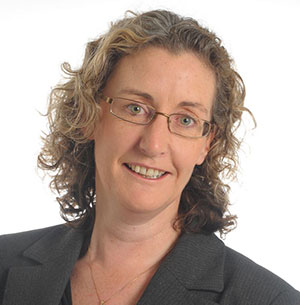 |
|
|
Distinguished Professor |
|
I recently travelled to Sydney, with Prof Francisco Ascui, to attend the Australian Research Data Commons Environmental Indicators Initiative workshop, and to Toowoomba, as a Board member of the Soil CRC. These meetings provided valuable opportunities to network and engage with partners and stakeholders from across the country. They also allowed for reflection on current projects in CeRDI, identification of new opportunities, and understanding of the challenges and prospects related to the environment, agriculture, and soils.
My travels have also highlighted different climate change challenges. For example, the drought conditions being experienced in south west Victoria contrasted sharply to the significant and visible impact of floods, rains and high tides in the northern states of Australia.
An upcoming research project in partnership with the Central Highlands Drought Resilience Plan implementation group will identify opportunities for diversifying agriculture to expand the scope and opportunities for regional producers to better respond to drought and climate change.
The PhD cohort at CeRDI continues to showcase their expertise and passion for research. We congratulate Dr Peter Weir on the successful examination of his PhD and welcome our newest PhD candidate, Sonia Proctor. Congratulations also to PhD candidates Rida Mazhar and Rebecca Farnell, who have successfully completed their Confirmation of Candidature.
Soil CRC appointment: Dr Nathan Robinson, Program Leader
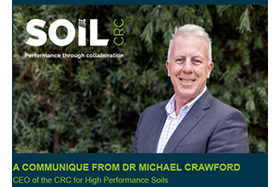 |
|
|
A communique from Dr Michael |
|
The Soil CRC recently announced that Dr Nathan Robinson has been appointed Program Leader for the Soil performance metrics ![]() research program. Nathan will be supporting activities linked to the research portfolio as an in-kind contribution by Federation University to the CRC.
research program. Nathan will be supporting activities linked to the research portfolio as an in-kind contribution by Federation University to the CRC.
The following extract about Nathan’s appointment was delivered in the Communique from Dr Michael Crawford:
I am very excited to announce that I have appointed Dr Nathan Robinson, Federation University, as Program Leader for Program 2, to replace Richard Doyle who finished up last month."
"Most of you know Nathan through his previous contributions to the Soil CRC, but here are some summary highlights from his Expression of Interest."
Research to build drought resilience in the Central Highlands
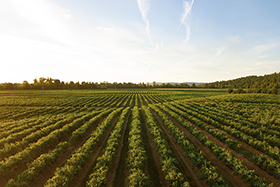 |
|
CeRDI recently commenced a study to explore and document new opportunities for the diversification of agricultural produce in the Central Highlands to accommodate the likely impacts of climate change. The project is funded by the Victoria Drought Resilience Adoption and Innovation Hub and Commerce Ballarat.
Climate change poses significant threats to agriculture in the Western region, with droughts and other climate impacts, presenting increasing challenges across farming communities. The economic repercussions are extensive, given that the agriculture sector is a major contributor to local economies. One of the primary concerns is the rising frequency and severity of droughts, reducing water availability for crops and livestock. This region is already prone to hot and dry conditions, and climate projections suggest that conditions will worsen in the coming decades.
Why should we care about groundwater?
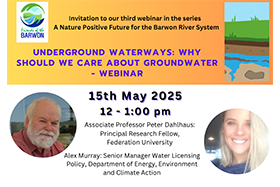 |
|
In May, the Friends of the Barwon delivered the third webinar in a series of sessions supporting the Nature Positive Future for the Barwon River System. The webinar included presentations from Peter Dahlhaus, Principal Research Fellow from CeRDI and Alex Murray, Senior Manager Water Licencing Policy from Department of Energy, Environment and Climate Action (DEECA).
Pete’s presentation told the captivating story of groundwater, its mechanics, complexity and importance. With particular focus on issues relevant to southwest Victoria, he made a strong case for the need to be mindful of the protection of shallow water tables, and their importance for the natural environment. He stressed that drawing water from aquifers can impact the depth of the water table and therefore needs careful management.
Where’s wormy? Research to determine the distribution of Barber’s Pole worm in sheep across Victoria
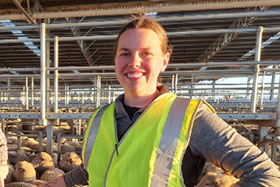 |
|
|
PhD Candidate, Rebecca Farnell |
|
Federation University PhD Candidate, Rebecca Farnell, is completing work to identify the current distribution of gastrointestinal nematode Haemonchus contortus, commonly known as Barber’s Pole, in sheep across Victoria. This research aims to incorporate this data into an animal welfare portal developed with Federation University’s Centre for eResearch and Digital Innovation (CeRDI), providing farmers and stakeholders with access to this data to assist in them with worm management. Rebecca’s work is supported by her supervisory team Dr Sarah Preston, Dr Christiane Bahlo and Professor David Piedrafita.
Barber’s Pole worm can kill sheep rapidly with high infections. It does this by producing haemorrhages in the fourth stomach of the sheep and feeding on the blood. This causes blood loss, resulting in anaemia, prominent swelling under the jaw, and death – leading to production loss for farmers. Historically, Barber’s Pole worm infections were known to be sporadic in Victoria, however many stakeholders are concerned infections are now endemic.
Harnessing legacy data for new insights
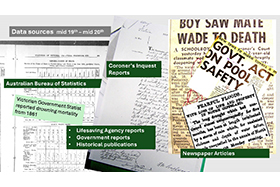 |
|
While much research focuses on generating new data, CeRDI has long recognised the value of historical data. This "legacy data" holds potential to address new research questions and CeRDI has been actively facilitating its use through various projects.
At the February CeRDI Research Seminar, Dr Carolyn Staines, CeRDI Research Associate, showcased the value of legacy data in preventing drowning deaths in developing communities. Globally, drowning claims at least 300,000 lives annually, predominantly in developing countries. Dr Staines' research utilised data spanning a century to tackle this issue.
Exploring diverse paths to Graduate Research at CeRDI: Sonia Proctor, PhD candidate
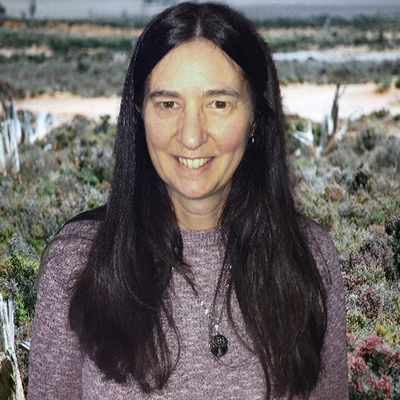 |
|
|
PhD candidate, Sonia Proctor |
|
At CeRDI, we celebrate the diverse journeys our students take to reach graduate research studies. While many follow the traditional route of completing an undergraduate degree, followed by an honours degree, and then a graduate degree, we are equally excited to welcome candidates who bring a wealth of professional experience and knowledge from different backgrounds.
One such exceptional PhD candidate is Sonia Proctor, who recently embarked on her graduate research journey. Sonia’s extensive background aligns perfectly with CeRDI’s strong focus on soils, data, and digital mapping.
Sonia, a graduate in Earth Science and Environmental Management, has been deeply involved in soil science since joining the Department of Conservation, Forests and Lands in 1989. In the early 1990s, she was part of one of Australia’s pioneering GIS and remote sensing groups, where she developed digital data and maps for GIS applications and conducted soils fieldwork across Victoria for the Department of Agriculture.
Early Career Researcher Seed Funding: Project outcomes
 |
|
Three CeRDI researchers were recipients of Federation University’s Early Career Research Seed Funding Program, 2024. Dr’s Chris Bahlo, Aakansha Chadha and Alison Ollerenshaw have progressed research in areas of expertise, delivering important outcomes. In this newsletter, Aakansha and Alison outline their research outcomes, with Chris to share insights from her research which will feature in the next newsletter.
Understanding the impact of the Dementia Pathways Tool; Lead Investigator: Dr Alison Ollerenshaw
The Dementia Pathways Tool ![]() is an enduring and comprehensive online tool designed to assist primary health care practitioners in the diagnosis and management of dementia. Launched in 2013, the Dementia Pathways Tool was one of the first online resources in Australia to be delivered to general practitioners about dementia management and care, and it remains the only online-accessible dementia resource in Australia for practice nurses.
is an enduring and comprehensive online tool designed to assist primary health care practitioners in the diagnosis and management of dementia. Launched in 2013, the Dementia Pathways Tool was one of the first online resources in Australia to be delivered to general practitioners about dementia management and care, and it remains the only online-accessible dementia resource in Australia for practice nurses.
Dr Peter Weir, Alumnus
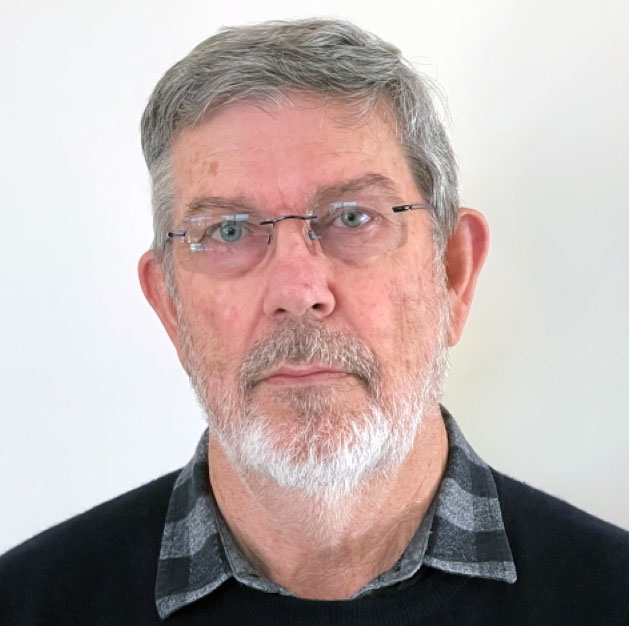 |
|
|
Dr Peter Weir, Alumnus |
|
Dr Peter Weir commenced his PhD in early 2020 with support from an Australian Government Research Training Program fee-offset scholarship through Federation University Australia and a scholarship from the Cooperative Research Centre for High Performance Soils funded by the Australian Government's Cooperative Research Centre Program.
Previous interest in soils and soil moisture management provided a strong background for the research undertaken into the measurement of the spatio-temporal variability of in-paddock plant-available water in dryland agriculture farming.
Peter’s research highlighted how the shortcomings of single point measurement of rainfall can be overcome with the innovative use of merged radar rain-gauge rainfall to estimate the spatial distribution of soil water within a paddock. This has resulted in development of an application for the inclusion of archival rain radar data from the Bureau of Meteorology’s Rainfields system into the Visualising Australasia’s Soils (VAS) portal.
News snippets
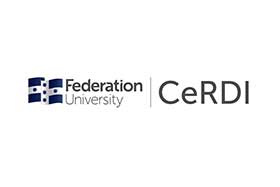 |
|
CeRDI Seminar series: CeRDI coordinates a monthly seminar series for its staff and post graduate students delivering short presentations on focus areas including research and technical projects, and HDR updates. CeRDI research associate Dr Carolyn Staines commenced the 2025 series with a presentation about legacy data and whether 150-year old data still useful? See the full story above. In March, Paul Feely, Senior Systems Analyst Programmer delivered an Interactive session about the Southern Farming System led Small Farm Dams project. Further details about this project can be found in the last issue of the newsletter.
In April, Keith Russell, Director Outreach at the Australian Research Data Commons (ARDC) ![]() presented at the CeRDI seminar. Keith is responsible for communicating the strategy, programs and direction of ARDC and engaging researchers and research organisations on the services and activities available to them. ARDC reaches out, delivers services and tools, and builds capacity in the sector through national communities and growing the skills of researchers and research support professionals in a range of areas related to data and digital research, including data governance, data creation, analysis, retention and sharing. Keith gave a presentation to CeRDI about research industry collaboration through trusted data infrastructure.
presented at the CeRDI seminar. Keith is responsible for communicating the strategy, programs and direction of ARDC and engaging researchers and research organisations on the services and activities available to them. ARDC reaches out, delivers services and tools, and builds capacity in the sector through national communities and growing the skills of researchers and research support professionals in a range of areas related to data and digital research, including data governance, data creation, analysis, retention and sharing. Keith gave a presentation to CeRDI about research industry collaboration through trusted data infrastructure.
HDR news
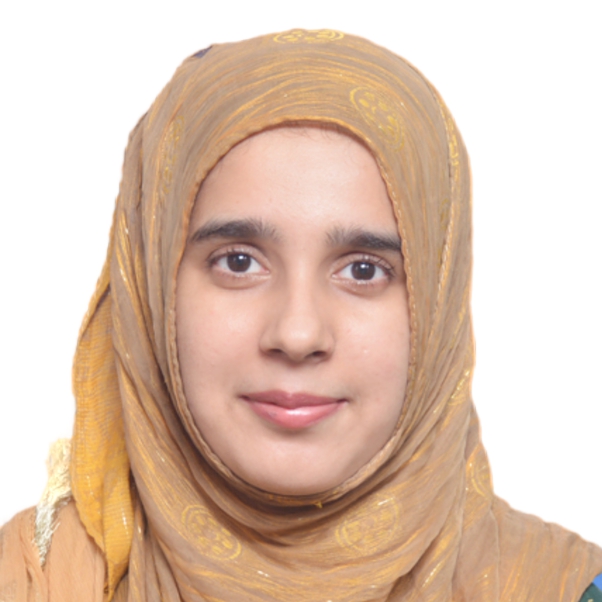 |
|
|
PhD candidate, Rida Mazhar |
|
Confirmation of Candidature: Congratulations to CeRDI PhD candidate Rida Mazhar who successfully completed her Confirmation of Candidature in May. Rida’s PhD is titled “Regional Smart City: Assessment and Progression towards Smart City Goals” is being supervised by Prof Helen Thompson, Dr Taiwo Oseni and Dr Shoaid Riaz. Rida Mazhar commenced her PhD at CeRDI in March 2024. Further information about Rida’s research and profile is available on the CeRDI website, here.
PhD research showcased by Soil CRC: Peter Weir’s PhD research was featured by the Soil CRC in a recent news story. The story highlights Peter’s innovative research in understanding within-field spatial variability of soil water. A highlight from research was “the merging of weather radar and rain gauges for dryland agriculture, resulting in the development of an application for the inclusion of archival rain radar data from the Bureau of Meteorology’s Rainfields system.”
To read the full story visit: Better understanding of within-field spatial variability of soil water - Soil CRC ![]()
About CeRDI
The Centre for eResearch and Digital Innovation (CeRDI) is a research centre at Federation University Australia focused on:
- the application of information and communications technology (ICT) and the development of innovative, world class knowledge management systems;
- significantly advancing the digital literacy and knowledge management capabilities of partner organisations;
- fostering partnerships for the development and implementation of eResearch with industry, government and academia; and
- measuring the impact of eResearch and digital innovation through longitudinal research.
Contact CeRDI
For further details about CeRDI’s diverse portfolio of research please visit our website: www.cerdi.edu.au, or contact Director, Distinguished Professor Helen Thompson: h.thompson@federation.edu.au
Mailing Address
Centre for eResearch and Digital Innovation
Federation University Australia
PO Box 691
Ballarat Vic 3353
Office Location
Suite 15, Greenhill Enterprise Centre
Ballarat Technology Park
University Drive
Mount Helen Vic 3350
Phone: +61 3 5327 9314
Email: support@cerdi.edu.au
Subscribe to the CeRDI Newsletter Mailing List
I would like to subscribe to the CeRDI Newsletter Mailing List to receive notifications of future CeRDI Newsletters.
If you have any feedback, please email newsletter@cerdi.edu.au

